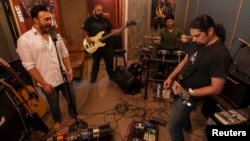Pakistan musicians celebrated Music Freedom Day on Tuesday in Peshawar, with a plea to "Don't Kill the Song."
Singers at the event, organized by the Takhleeq Development Foundation, told VOA Deewa that religious intolerance in the region has contributed to what they argue is the government's failure to protect Pakistani musicians and other artists from religious persecution and to promote their cultural contributions.
“I think at the stage where society stands today, there is no tolerance," actor Arshad Hussain told Deewa. "We do not listen to each other, we do not accept each other’s ideology, we do not accept each other’s sect, we do not accept each other’s existence," he added, arguing "music, fun, art and culture can play a big part, if they are given an opportunity.”
Hussain called on the government to mobilize the younger generation of artists. Others looked to protecting the older generation.
“It is so sad," said prominent Pashtun singer Bakhtiyar Khattak. Senior artists "are dying. Nobody asks about them. There is no government policy.”
The musicians said the current leadership of Pakistan's northwestern Khyber Pakhtunkhwa province must do better. One step, they said, would be to reopen the only music and art performance complex in Peshawar, Nishtar Hall. It was closed to all music and entertainment from 2002 to 2008 under a conservative coalition government.
That government, led by religious parties, also closed down the centuries-old musicians street in Peshawar. The Taliban movement and fundamentalist religious parties in the country consider music forbidden in Islam.
Emboldened by the anti-music campaign, militants in Khyber Pakhtunkhwa also blew up music shops and cinemas across the province. They intimidated, kidnapped, even killed artists. In 2009, two female artists from Swat were slain with apparent impunity, their bodies left lying in a busy square.
The campaign forced some musicians, singers and actors to abandon their work or flee to safer places in Pakistan or Afghanistan. Some were granted asylum in Europe and the United States.
Musicians at Tuesday's event expressed continued concerns about their safety and security.
While the security situation remains difficult, regional officials said they would do more to promote Pakistan's artistic heritage.
“God willing, I will make amends,“ Amjad Afridi, provincial minister for culture, told Deewa, conceding little has been done at the government level to promote art and culture and promising that progress would be made.
The minister also promised that Nishtar Hall would be renovated and reopened.




